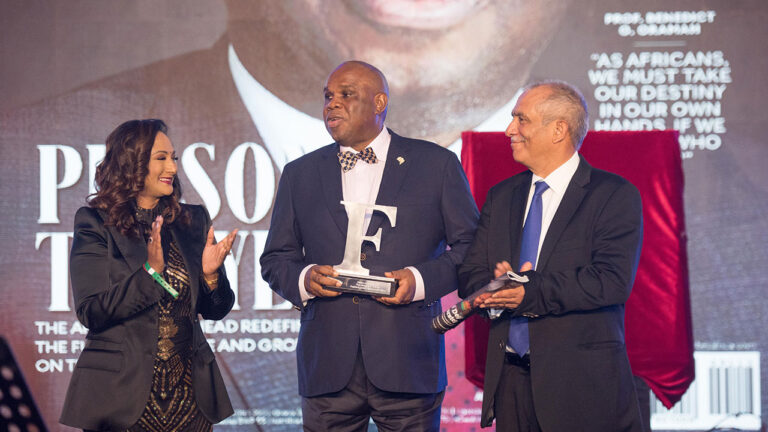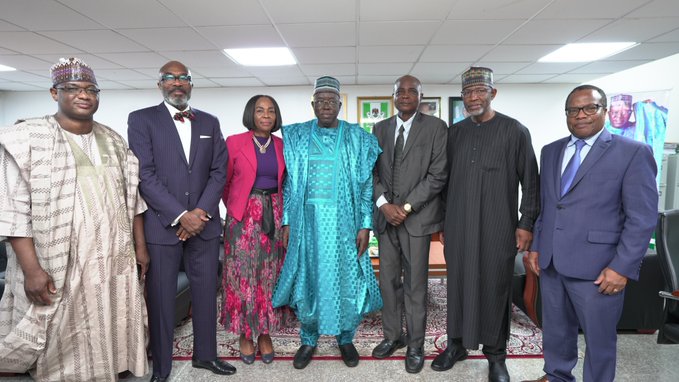With a strategic vision to be the reference point for commodities in Africa, AFEX, a Nigeria based commodity trade solutions company is enmeshed in a quest to contribute to Africa’s food security.
What this means, is that the company is driven to enable efficient trade on the continent. To do this, Ayodeji Balogun AFEX’s chief executive says the business deploys a commodities exchange model that starts at the producer level, ensuring improvement in productivity and livelihoods while building up commodity volumes in the right quality and quantity for local and regional trade.
AFEX predominantly works at the intersection of Agriculture, technology, and financial markets. The company started as a business in the physical market engaging in aggregation and storage of commodities, then created a technology platform to trade securitized versions of these physical commodities, while also driving funding for the sector through a range of financial instruments targeted at retail and corporate investors.
Today AFEX has three fully independent entities each working to create value for the commodities market.
With almost twenty years’ experience trading across West Africa as well as in building and scaling businesses across Sub-Saharan Africa, Balogun has served on several capital market boards and worked with varied institutions on food security and financing agriculture.
Balogun’s interest in business began as a teenager. “My interest in commodity trading was stoked early when I began learning about trade in the family business. My solo run as an entrepreneur started at thirteen, when I had to consummate a transaction worth USD 4,000 (at today’s value). From there on, I grew to manage the family-owned commodities trading business, with a turnover of over USD15 million, before joining the MBA program at Lagos Business School”.

The bulk of the company’s activities connect to the goal of contributing to food security in Africa, including, Balogun noted, “the provision of better access to inputs, credit facilities, micro-insurance, storage services, training, and markets for smallholder farmers. We have reached over 500,000 farmers across our operational locations since we started up in 2014, and we have also unlocked over $400 million in financing for the agriculture sector on the continent in that period”.
Balogun is thrilled with the successes chalked up by AFEX over the years. “For one, we have successfully created an ecosystem that connects the farmers within our network to formal markets, which improves their livelihoods and earning potential. We have also deployed infrastructure that places farmers within 5km of our warehouses, located across 34 states in Nigeria, drastically reducing post-harvest losses that costs the country about N3.5 trillion in losses annually”.

Also, important, he adds, has been the work undertaken to connect the financial markets to the commodities market in the country. “We have created systems and processes for securitizing commodities and enabling alternative investment opportunities for both retail and institutional investors.
“We have now scaled our physical market operations across 4 African countries in West and East Africa, building trade inroads and supporting the agriculture ecosystem in Africa. These achievements to date fit into our larger picture of enabling seamless and efficient trade with Africa and playing a part to future proof our food systems on the continent.
“Today we are in 4 African countries, with a timeline to hit 10 total countries over a 10-year timeline. Our goal is to be a fundamental engine for intra-Africa trade coordination and make it truly seamless for Africa to trade across borders and ultimately for the rest of the world to trade with Africa”.

Balogun is pretty confident about AFEX’s ability to continue to unlock capital for the sector and run programs that are both impactful and commercially sustainable. “Our commodities exchange model facilitates access to crucial resources such as financing, storage facilities, and other essential services, which ultimately enhance productivity and competitiveness. It is a model that is a core aspect of the food system transformation that Africa requires and one that we are happy to deploy alongside other innovative players.
“We also remain bullish that the solutions that we have developed are scalable across other African countries, and we will continue to expand across the continent in a way that allows us to enhance intra-Africa trade in key commodities, working alongside governments across Africa and other private sector players”.
Balogun says the huge infrastructure gap the continent was one of the first challenges that the company encountered, adding, “and that changed our entire reasoning on what we had to build. That infrastructure challenge continues to persist, and we invest a significant amount in expanding it, especially when you think of storage infrastructure, for both the benefit of our business and the industry at large.
“These tie very much to the next point of funding and the ability to access and unlock the right type of funding in the sense of structure and timing for both our direct business needs but more importantly for the sector at large. Here we have also done a lot of work, innovating around product development in ways that allow capital to be unlocked from a variety of sources.
Balogun admits that global and local economic and climate related risks have informed AFEX’s strategic business decisions especially in the preceding years.

“The past year was one of significant turbulence in the global economy. From financial crises to geopolitical tensions, the economic challenges certainly impacted the commodities market. In Nigeria particularly, food inflation reached new heights requiring even more engagement with the agriculture sector from the government.
“The sector is therefore dealing with macro headwinds and economic shifts that are being experienced in most other industries in addition to more closely correlated climate change effects that are causing significant shifts around mitigation and adaptation strategies.
“The commodities sector is expected to witness an interplay of geopolitical, economic, and environmental factors that will potentially dictate prices and production for the next year. The 2023 domestic commodities market witnessed a notable increase in the average cost of farm inputs by 71%, a significant surge in farm labor costs by 149%, and a spike in transportation costs of over 130%, which were attributed to the dual impact of fuel subsidy adjustments and foreign exchange (FX) devaluation in June.
While the impact on 2023 was minimal, Balogun admits that these policies are likely to significantly affect production and prices in 2024. For one, key export commodities like Cocoa and Sorghum are projected to rise by 50% and 20% respectively, underpinned by declined production, while key consumption commodities like Maize and Paddy Rice are projected to rise by 25% and 40% respectively, despite a 4% increase projection on production of Paddy Rice.
Surpassing these challenges, he posits, require a combination of vigilance, strategic adaptation, and continuous monitoring.

On the company future, Balogun notes, “we often like to see AFEX as an organization that provides infrastructure for the sector and incentivizes players to participate. Food security and intra-Africa trade coordination are goals that require a lot of cooperation. We often refer to this as “Coopetition” where we prioritize partnerships to deepen capacity, capital, and labor in the sector, which then provides a healthy environment for competition. This is why we have chased strategic partnerships with stakeholders in both the public and private sector”.
Driving growth for Africa’s commodities market, he posits further, requires strong collaboration across state and non- state actors, willing to work together before competing with each other.
AFEX, he says is very focused on improving its efficiencies and core competency across its operations. “We are a very agile company, and we are constantly realigning the way we work against global standards, taking advantage of opportunities in the market, while strengthening our responses and approaches to challenges”.
Education and Courses –
B.Sc. in Mechanical Engineering from the Lagos State University,
MBA from Lagos Business School,
Certificate in Creative Leadership from the THNK School of Creative Leadership.
Global CEO – Africa program of IESE Business School, and
Managing Fast Growing Companies Executive Program of the Stanford Graduate School of Business.
Hobbies: In my free time, I enjoy travelling, sampling coffee from across Africa and learning languages along the way.












